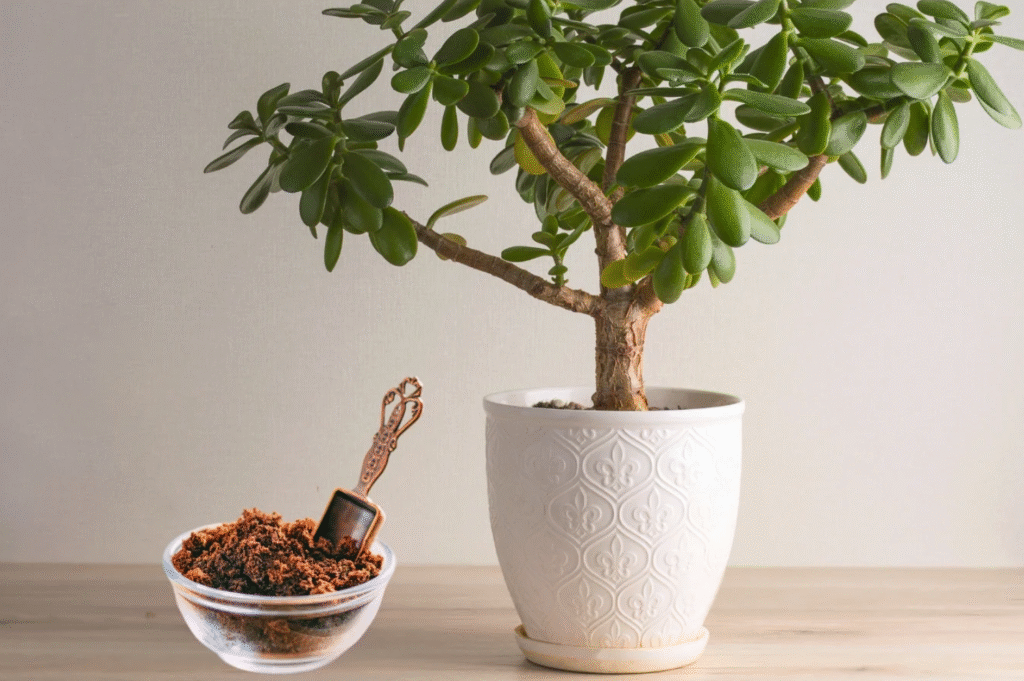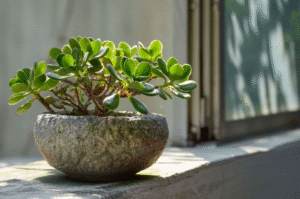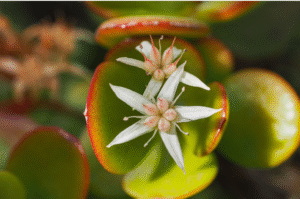Jade plants (Crassula ovata) are one of the most beloved succulents among plant lovers. Their thick, glossy leaves and low-maintenance nature make them ideal for homes, offices, and indoor gardens. As plant enthusiasts search for natural and budget-friendly fertilizers, coffee grounds often come up as a popular option. But the big question remains: Do jade plants actually like coffee grounds?
Let’s dive into the science, benefits, risks, and expert care tips to help you decide whether coffee grounds are good for your jade plant.
What Are Coffee Grounds?
Coffee grounds are the leftover residues from brewed coffee. They are organic, rich in nitrogen, and contain small amounts of other minerals like calcium, potassium, magnesium, and phosphorus. Many gardeners use coffee grounds as compost material or a soil additive to boost plant growth.
But not every plant benefits from them the same way, especially succulents like jade.
Do Jade Plants Like Coffee Grounds?
Jade plants can benefit from coffee grounds, but only if used correctly. Their soil and feeding requirements are very specific. Jade plants prefer slightly acidic to neutral soil (pH 6.0–7.0) and dislike overwatering or excess nutrients. Fresh coffee grounds are acidic, which may not always be ideal for jade.
Used or composted coffee grounds, on the other hand, are milder and can offer benefits when properly diluted or added to compost.
Pros of Using Coffee Grounds for Jade Plants
1. Natural Source of Nitrogen
Nitrogen is an essential nutrient for leaf development. A small amount of nitrogen from coffee grounds can help jade plants produce fuller, healthier foliage.
2. Improved Organic Matter
When used as compost, coffee grounds add organic material to the soil, improving aeration and drainage, which jade plants love.
3. Pest Repellent
Some studies suggest coffee grounds may deter pests like ants, slugs, and even some fungal infections when sprinkled on top of the soil surface.
Cons of Using Coffee Grounds on Jade Plants
1. Too Much Moisture Retention
Coffee grounds are fine-textured and can compact, which leads to poor drainage. Jade plants are prone to root rot, so soggy soil is a big no.
2. High Acidity (If Fresh)
Jade plants don’t thrive in overly acidic soil. Fresh coffee grounds are too acidic, which can disturb the pH balance and stress the plant.
3. Fungal Risk
Used grounds can grow mold if left moist on the soil surface, especially in indoor environments. This can damage succulent roots or attract gnats.
Best Ways to Use Coffee Grounds for Jade Plants
If you’re thinking of trying coffee grounds for your jade plant, here are safe and effective methods:
1. Compost First
The safest method is to add coffee grounds to your compost bin. Let them break down fully, then mix the finished compost into the potting soil. This eliminates the risk of acidity or mold and improves soil texture.
Pro Tip: Use compost in a 10–20% ratio of total soil mix.
2. Make Liquid Coffee Ground Fertilizer
Steep a tablespoon of used coffee grounds in a liter of water for 24–48 hours. Then strain and use this water to feed your jade plant once every 4–6 weeks.
This diluted tea offers nutrients without compacting the soil or creating acidity.
3. Mulch Sparingly
You can sprinkle a very thin layer (not more than ¼ inch) of used coffee grounds around the top of the soil, but only if the plant is placed in a well-ventilated, sunny location. Avoid this method during cold or humid weather.
Signs Your Jade Plant Doesn’t Like Coffee Grounds
If you’ve applied coffee grounds and notice the following signs, stop immediately:
- Yellowing or curling leaves
- Soft or mushy stems
- Mold or white fungus on the soil surface
- Foul smell from the pot
- Stunted growth
These signs often point to overwatering, poor drainage, or excess nutrients (all of which can be triggered by improperly used coffee grounds).
Better Alternatives to Coffee Grounds for Jade Plants
If you’re unsure about using coffee grounds, here are safer, jade-friendly options:
1. Cactus/Succulent Fertilizer
Use a balanced, low-nitrogen fertilizer specifically designed for succulents once every 2–3 months.
2. Worm Castings
Worm castings are organic, mild, and provide slow-release nutrients without affecting soil pH.
3. Crushed Eggshells
They are rich in calcium and help neutralize soil acidity. Crush and mix them into the soil for long-term benefits.
Expert Opinion
Horticulturists and succulent specialists generally agree:
“Coffee grounds are best used in compost rather than directly applied to succulent pots. Jade plants thrive in airy, fast-draining soils and do not respond well to compact materials that retain moisture.”
So, while it’s okay to experiment, moderation and preparation are key.
Final Verdict: Should You Use Coffee Grounds on Jade Plants?
Coffee grounds can be beneficial to jade plants, but only when composted or diluted. Using them fresh or in excess can harm more than help. If you’re looking for an organic, budget-friendly option, start by adding used grounds to your compost bin (not directly to the pot).
Do jade plants like coffee grounds?
Yes, but only if used wisely.
Quick Dos and Don’ts Summary
Do:
- Use used coffee grounds, not fresh
- Compost them before applying
- Dilute into liquid for watering
- Monitor plant health after application
Don’t:
- Apply thick layers of grounds on the soil
- Use grounds in poorly drained pots
- Add coffee directly without composting
- Use too frequently or in large amounts
Conclusion
In the world of plant care, natural additives like coffee grounds can offer many benefits, but only when used appropriately. For jade plants, the key is balance. Coffee grounds can supplement your plant’s growth if composted, diluted, and used in small doses.
When in doubt, test on a small area of soil and observe. With patience and smart practices, your jade plant will thank you with lush, vibrant foliage.






